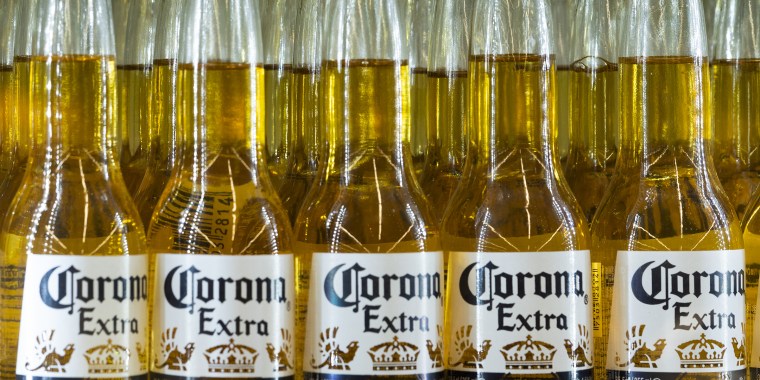Does the deadly coronavirus have anything to do with Corona beer?
Absolutely not.
Unfortunately for the popular pale lager, fear and panic about the disease is reportedly having a negative impact on the brand's image.
On Monday, Corona's official Twitter account shared a video teasing its newest product, Corona Hard Seltzer.
The short clip begins with a splash of water before revealing four cans of the sugar-free, sparkling beverages sitting on a beach.
Along with the video, the company wrote, "Introducing Corona Hard Seltzer. Four delicious flavors. One splashy entrance."
But the tagline that appeared at the end of video — “Coming ashore soon." — immediately began rubbing people the wrong way. Responses to the ad varied from shock to disgust, with many noting that the timing of the announcement for a new Corona product seemed poor given that the virus is continuing to spread.
Despite the negative backlash, Corona has not taken down the post. When reached via email, Michael McGrew, the senior vice president of corporate communications for Constellation Brands (Corona's parent company) told TODAY, "Now that our (new) product has officially hit the market, our campaign will obviously evolve. Early signs are extremely positive and we have high expectations for this new brand offering."
He also reiterated that that the company's "advertising is consistent with the campaign we've run for the past 30 years in the U.S."
Though plenty of news coverage has debunked any linkage between the top-selling beer and the virus, in January, searches for terms like “corona beer virus,” “beer virus,” and “beer coronavirus” spiked, according to Google search trends.
Aside from the ad campaign, the brand is also being targeted in countless memes and snarky tweets.
A YouGov analysis published Wednesday found that, among U.S. adults, "purchase intent for the (Corona) brand is at the lowest it’s been in two years."
The market research firm also released a Corona buzz score, a number that measures whether people have heard something positive or negative about a brand over a certain period of time. Corona’s buzz score has dropped over 20 points since the beginning of January when news about the virus started to dominate headlines.
A different poll, conducted by the public relations firm 5WPR this month, surveyed 737 beer-drinking Americans to get their current opinions on the well-known beer brand. Of those surveyed, 38% of respondents said they "would not buy Corona under any circumstances now," and 14% said they wouldn't order the beer in public. Sixteen percent of those surveyed admitted confusion about whether the beer was directly related to coronavirus.
Though 5WPR does not represent any beer brands, Whole Foods (which sells Corona) is one of the firm's clients.
"While the brand has claimed that consumers understand there's no linkage between the virus and the beer company, this is a disaster for the Corona brand," Ronn Torossian, founder and CEO of 5WPR, said in a press release. "After all, what brand wants to be linked to a virus which is killing people worldwide?"
When asked about the recent surveys, McGrew told TODAY that despite any negative reports, beer sales have remained strong.
"Based on recent IRI retail trends, sales of Corona Extra and the entire Corona brand family remain strong in the latest 4-week and 12-week time periods, performing above their 52-week trends. And feedback from our distributor and retailer partners confirms the continued momentum we're seeing among consumers for this brand," he said.
Corona first announced the launch of its new line of hard seltzers in January, along with plans to spend $40 million in marketing, the “largest ever single brand investment” for the company, Constellation Brands CEO Bill Newman told Beverage Daily. Corona's hard seltzer line joins an increasingly crowded marketplace of spiked seltzers, which have surged in popularity as consumers seek out alcoholic beverages with fewer carbs and less sugar than traditional bar drinks.
McGrew added that the company has "seen no impact to our people, facilities or operations," and called the circulation of any misinformation about the brand "extremely unfortunate."
"Unlike many of our competitors, sales of our beer brands are focused almost entirely on the U.S. market. Our company does not have much exposure to international markets such as China that have been most impacted by this situation," McGrew said.

